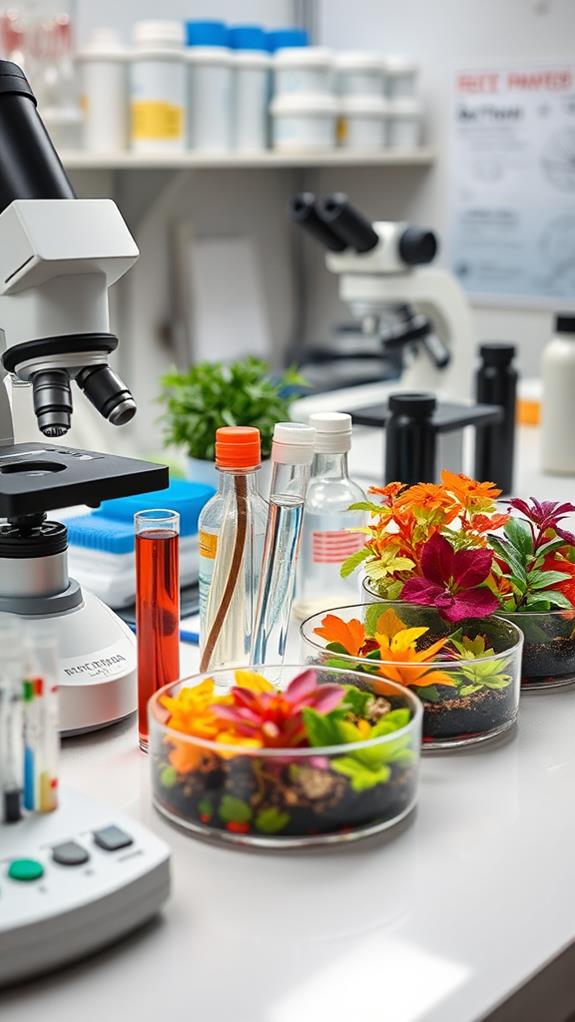Interesting Facts About GMOs That Will Surprise You
You might be surprised to learn that GMOs have far-reaching impacts beyond agriculture. They've revolutionized medicine, with genetically engineered insulin helping over 1 million Americans manage diabetes. In the environmental sphere, GMOs have reduced soil erosion by 93% and cut pesticide use by 37%. They're also preserving crop diversity by developing disease-resistant varieties. Contrary to popular belief, GMOs undergo rigorous safety evaluations, with long-term studies showing no increased health risks. From non-browning apples to Golden Rice that could save millions from vitamin A deficiency, GMOs offer unexpected benefits in various sectors. The more you explore, the more you'll discover about these groundbreaking innovations.
This post may contain affiliate links. If you make a purchase through these links, I may earn a commission at no additional cost to you. Additionally, portions of this post may be generated using artificial intelligence (AI) technology. While we strive for accuracy, please be aware that AI-generated content may not always be perfect and should be fact-checked when necessary.
The Spatula Scoops
- GMOs have reduced greenhouse gas emissions by approximately 326 million pounds since the mid-1990s.
- Over 100 biopharmaceutical drugs have been developed using genetic engineering techniques.
- Golden Rice, a genetically modified crop, has the potential to save over 1 million children from vitamin A deficiency.
- GMOs have decreased herbicide runoff by 70%, resulting in cleaner water ecosystems.
- Genetically engineered insulin is used by approximately 1.25 million Americans with type 1 diabetes.
GMOs in Medicine

Genetic engineering breakthroughs have revolutionized medicine since the 1970s. You might be surprised to learn that GMOs, or genetically modified organisms, play a vital role in modern healthcare. The first GMO approved for medical use came in 1982, producing insulin for type 1 diabetes patients. Today, about 1.25 million Americans rely on this genetically engineered insulin to manage their condition effectively.
But that's just the beginning. Over 100 biopharmaceutical drugs have been developed through genetic engineering, offering treatments for a wide range of health issues. These include cancer, arthritis, hemophilia, and seizures. The impact of GMOs in medicine goes far beyond what you might expect from their controversial reputation in agriculture.
These precision therapies, made possible by genetic engineering, have considerably improved treatment options and quality of life for patients with chronic and life-threatening diseases. By enabling the production of specific proteins and compounds, GMOs have become indispensable in creating targeted medications. As you can see, the development of GMOs in medicine demonstrates the essential role genetic engineering plays in advancing healthcare and saving lives.
Consumer Benefits of GMOs

The consumer benefits of GMOs extend far beyond the farm and into your local grocery store. You'll find genetically modified products that cater to your needs, like non-browning apples that stay fresh longer and soybeans with improved nutritional profiles. These innovations are just the tip of the iceberg when it comes to how GMOs can enhance your food supply.
Did you know that Golden Rice, a genetically modified crop, has the potential to save over a million children annually from vitamin A deficiency? This showcases the significant impact GMOs can have on public health. Additionally, precision gene editing technologies are creating more resilient crops, increasing both the availability and variety of food options you see on shelves.
GMOs contribute to food security by boosting crop yields on less land, effectively providing more nutrition while reducing pressure on agricultural resources. This efficiency in production can lead to lower prices and greater accessibility for you as a consumer. From enhanced nutritional content to improved shelf life, the consumer benefits of GMOs are tangible and far-reaching, potentially revolutionizing your daily food choices and overall well-being.
Environmental Impact of GMOs

When it comes to the environmental impact of GMOs, the evidence paints a compelling picture of sustainability and conservation. You might be surprised to learn that genetically modified crops have greatly reduced soil erosion by 93%, promoting better soil health and agricultural sustainability. This improvement in soil quality is just one of the many ways GMOs save our environment.
Water quality has also benefited from GMO cultivation. There's been a 70% decrease in herbicide runoff, which means cleaner water in surrounding ecosystems. Additionally, greenhouse gas emissions have been cut by approximately 326 million lbs since the mid-1990s, contributing to the fight against climate change.
Here are three more environmental benefits of GMOs:
- 37% reduction in pesticide usage, improving both environmental and human health
- Higher crop yields, allowing for more efficient land use and habitat conservation
- Preservation of biodiversity through reduced agricultural expansion
You'll find that GMOs have a positive impact on various aspects of our environment. From soil health to water quality and air pollution reduction, genetically modified crops are playing an essential role in creating a more sustainable agricultural future.
GMOs Preserving Crop Diversity

Over the past few decades, you've likely heard concerns about declining crop diversity. However, genetically modified organisms (GMOs) are playing a surprising role in preserving and even enhancing biodiversity in agriculture. GMOs can help maintain a variety of crops grown by developing disease-resistant varieties, ensuring the survival of different cultivars that might otherwise succumb to outbreaks.
The preservation of genetic material through GMOs isn't limited to protecting existing varieties. By incorporating traits from a wider gene pool, genetic modification facilitates crop adaptation to changing environmental conditions. This process supports biodiversity in agricultural systems and optimizes land use efficiency, preventing the conversion of natural habitats into farmland.
Here's a breakdown of how GMOs contribute to crop diversity:
| Aspect | GMO Contribution | Impact on Biodiversity |
|---|---|---|
| Disease Resistance | Develop resistant varieties | Protects vulnerable cultivars |
| Adaptability | Incorporate wider gene pool | Enhances crop resilience |
| Nutrition | Engineer for better nutrients | Complements traditional varieties |
| Land Use | Improve yield efficiency | Preserves natural habitats |
Through these mechanisms, GMOs help sustain diverse cropping systems, allowing various species and cultivars to coexist within agricultural landscapes.
Are GMOs Responsible for Any Surprising Facts About Corn?
Genetically modified organisms (GMOs) have transformed how we grow crops, leading to some interesting facts about corn. For instance, nearly 90% of the corn grown in the U.S. is genetically engineered, enhancing resistance to pests and improving yields. This innovation has significantly shaped modern agriculture and global food production.
GMO Safety and Regulation

Safety and regulation of GMOs are critical aspects of their development and use. You might be surprised to learn that GMO crops undergo extensive safety evaluations before they're introduced to the market. These assessments, conducted by regulatory agencies like the FDA and USDA, guarantee that GMOs pose no greater risk than conventional crops.
When it comes to human consumption, long-term animal testing and scientific consensus from organizations like the World Health Organization indicate that GMO foods aren't riskier than non-GMO options. However, each new GMO must be individually assessed for potential health risks, including the introduction of new allergens through genetic modifications.
The adoption of GMO crops has led to some impressive results:
- 37% reduction in pesticide usage
- 22% increase in crop yields
- Improved agricultural sustainability
To maintain ongoing safety, continuous monitoring systems are in place. These systems reinforce regulatory oversight for both human and environmental safety. While concerns about GMOs persist, it's important to understand that they're heavily regulated and extensively tested to validate their safety before reaching your plate.
Frequently Asked Questions
What Is the Most Interesting GMO?
While all GMOs have their merits, you might find Golden Rice the most intriguing. It's engineered to produce beta-carotene, addressing vitamin A deficiency in developing countries. This simple modification could potentially save over 1.15 million children annually from related health issues. You'll appreciate how this GMO tackles a global nutritional challenge, showcasing the power of genetic engineering to improve lives. It's a prime example of how biotechnology can be harnessed for humanitarian purposes, making it a standout in the world of GMOs.
What Are 3 Potential Benefits of GMOS?
You'll find that GMOs offer several potential benefits. First, they can enhance crop yields, helping to address global food security concerns as the world's population grows. Second, GMOs can reduce the need for pesticides, which is good for both farmers' wallets and the environment. Finally, genetic modifications can improve the nutritional content of foods, like Golden Rice, which is fortified with vitamin A. These benefits showcase how GMOs can positively impact agriculture, the environment, and human health.
What Can GMOS Do to You?
You might worry that GMOs could harm you, but that's not the case. GMOs can actually benefit you in several ways. They can provide you with essential nutrients, like in Golden Rice, which could save children from vitamin A deficiency. You'll find GMOs in medical treatments, such as insulin for diabetes management. They can also offer you safer food options, like hypoallergenic peanuts. GMOs undergo rigorous safety testing, so you can feel confident about their health impacts.
What Is Unique About Genetically Modified Organisms?
You'll find that genetically modified organisms (GMOs) are unique in their precision and versatility. Unlike traditional breeding, GMOs allow for the targeted transfer of specific traits between organisms. They've revolutionized medicine, producing insulin for diabetes and over 100 biopharmaceutical drugs. In agriculture, GMOs like Golden Rice combat nutritional deficiencies, potentially saving millions of lives. They also offer environmental benefits, reducing soil erosion and herbicide runoff. GMOs' impact extends far beyond traditional agriculture, shaping modern medicine and environmental conservation.





